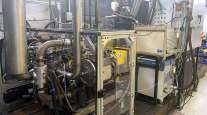Senior Reporter
NACFE Says Trucking’s Future Is With Hydrogen

[Stay on top of transportation news: Get TTNews in your inbox.]
The North American Council for Freight Efficiency said as the trucking industry moves toward zero-emission vehicles during the next several decades, its research finds that hydrogen-powered trucks are the best option to reach those long-term goals.
But while the Fort Wayne, Ind.-research organization is bullish on hydrogen, its new report, “Hydrogen Trucks: Long Haul’s Future” also says other current fuels — including diesel and alternatives now coming into the marketplace — will continue to play an important role in trucking’s future.
“This is something that’s a journey and we’re going to be taking it for a while,” NACFE Director of Emerging Technologies Rick Mihelic said on a conference call with reporters on April 4. “You’re going to need some solution to go the long distances. Driving 600 to 700 miles is not going to be possible with battery-electric [trucks] with heavy-duty payloads. It’s not the solution for every duty cycle, but it is a solution for part of the work that diesel engines are doing today.”
Mihelic said going forward, hydrogen internal combustion engines could continue to grow in popularity because they are similar to engines fleets use today.

Mihelic
“They still suffer from the same infrastructure issues in that you need to get the hydrogen out there,” he said. “But it may be less of a leap of imagination for fleets to move to a hydrogen engine before they move into fuel cells.”
NACFE Executive Director Mike Roeth and his team say they have spent considerable time researching the future needs of the industry, including on hydrogen and battery-electric vehicles through their Run on Less programs. In 2022, Run on Less focused on battery-electric vehicles and in late April, another research program begins looking at charging depots for fleets that run electric trucks.
“One of the things we know is that battery-electric [trucks] are here and they’re going to come ahead of fuel cells,” Roeth said.
New Report: Hydrogen Trucks In Long Haul Applications - https://t.co/UxOub0QRnf#hydrogen #hydrogenfuelcell #hydrogenICE pic.twitter.com/jrSAHqRfm0 — North American Council for Freight Efficiency (@NACFE_Freight) April 4, 2023
NACFE’s new report is an update from its December 2020 study on hydrogen, which compared that fuel with other alternative fuels for heavy-duty trucks.
The report’s key points:
- Hydrogen fuel cell trucks are just starting to see real-world use, and their adoption is being driven by regional or national considerations that are much bigger than what exists for trucking fleets.
- Battery-electric trucks should be the baseline for hydrogen fuel cell electric vehicle (HFCEV) comparisons rather than any internal combustion engine alternative.
- As for all alternatives, fleets should optimize the specifications of HFCEVs for the job they should perform while expecting that the trade cycles will lengthen.
- The future acceleration of HFCEVs is likely not about the vehicles or the fueling but more about the creation and distribution of the hydrogen itself.
- The potential for autonomous fuel cell trucks to operate 24 hours a day adds significant opportunity for making sense of capital and operational investments in hydrogen.
The report concludes that battery-electric and hydrogen are both needed to reach the zero-emission goals being set by governments in the United States and around the world. It says battery-electric vehicles will be best utilized for shorter distance and regional trips, while hydrogen offers the best potential for longer, over-the-road duty cycles.
It also says the transition to hydrogen fuel cell electric vehicles will take two decades and during that time, alternative fuels such as renewable natural gas and renewable diesel will be required to support the transition.
But NACFE says eventually a choice will be made by the transportation industry, government and other stakeholders — choosing between gaseous or liquid hydrogen and then building out the infrastructure to support that choice. It takes more trucks and trailers to move the same amount of gaseous hydrogen than for liquid hydrogen.

Roeth
“There’s a lot here that makes it more challenging than battery-electric,” Roeth said. “But there’s no way we can avoid it. If you need a zero-emission future, this is where we’re headed.”
A liquid hydrogen tanker can move nearly the same amount of energy as a liquid diesel tanker and Roeth said if that’s the way the industry goes, hydrogen could be transported to fueling locations almost identically to the way diesel is moved now. However, if gaseous hydrogen is decided upon, it could take as many as eight trucks to match the energy density of one liquid tanker truck.
The report says trucking fleets are on board with the move toward hydrogen and see it as the future.
“Hydrogen technology is coming faster than we expected. We will be testing a truck this year,” said Rob Reich, Schneider’s chief administrative officer.
Want more news? Listen to today's daily briefing below or go here for more info:




